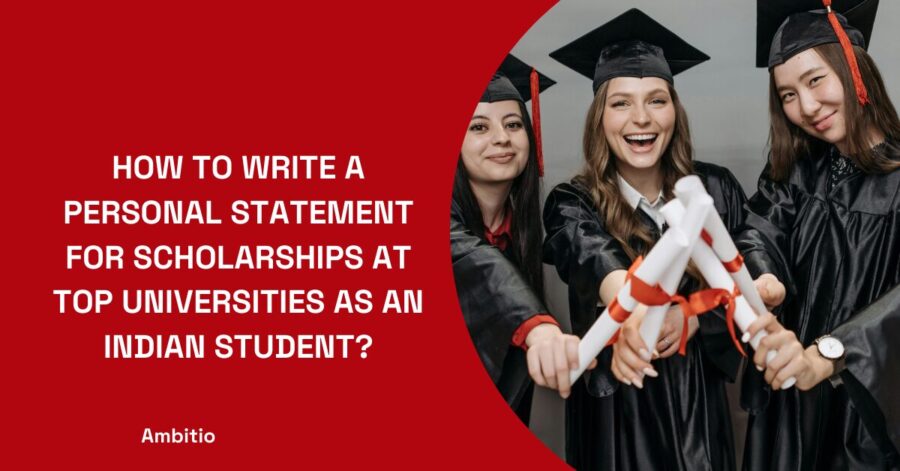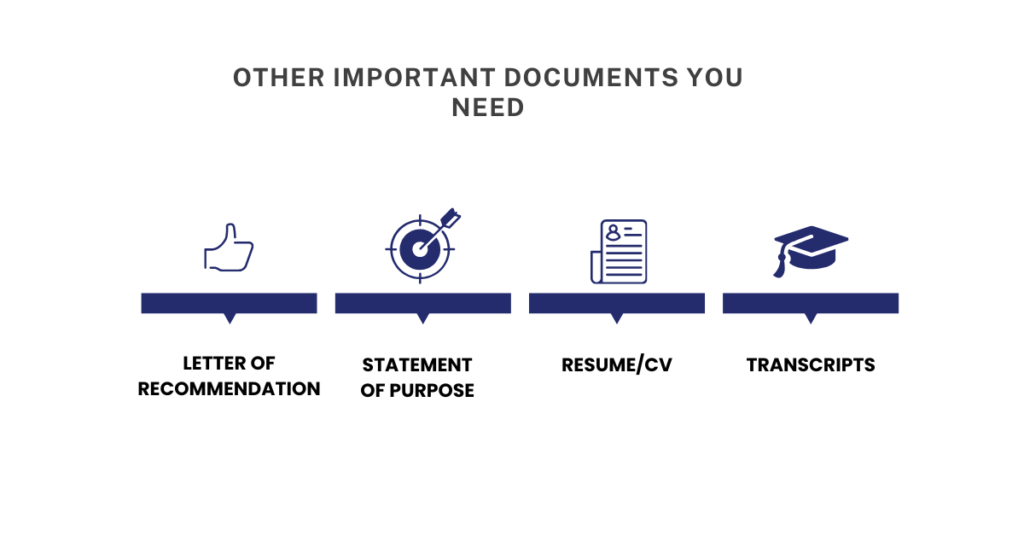12 May 2025
6 minutes read
How To Write A Personal Statement For Scholarships At Top Universities As An Indian Student?

Key Takeaways
- Write a personal statement for scholarship that tells your story, not your résumé.
- Use your essay to explain gaps, flaws, or moments of growth that numbers can’t.
- Align every part of your application with your values, goals, and academic fit.
Only 0.1% of applicants win full-ride scholarships — and no, it’s not because they used fancier fonts. And that certainly means – one wrong word, one bland sentence, one missed spelling or grammar error — and boom, your scholarship application is toast. It’s not that you’re not smart enough. It’s just that no one ever taught you how to describe your motivation without sounding like a robot or a résumé.
So we believe you need to stop trying to impress. Start trying to relate. The best personal statements don’t scream “pick me.” They engage, inspire, and contribute something real. You don’t need a thesaurus — you need a story. Be specific, be human, and above all, revise like your financial aid depends on it (because, well, it probably does).
How A Personal Statement Can Help With Scholarship?
If you think a personal statement is just a boring essay you have to write before you submit your scholarship application — think again. It’s not just a hoop to jump through. It’s the one piece of writing that can override a less-than-perfect grade, explain a weird gap year, and make a graduate committee actually remember your name. In short, it’s your cheat code — if you use it right.

Here’s what your personal statement really does (and no one tells you):
- It proves you’re more than your GPA — your achievement isn’t always in the numbers, it’s in the grit behind them
- It gives you control of your story — not just what you apply for, but why you care about the course
- It adds weight to your extra-curricular work — not as random hobbies, but as proof of your interest and drive
- It helps reviewers remember you — because stats blur together, but a strong essay response sticks
- It can cover your flaws — used wisely, it turns missed deadlines or dips in academic performance into moments of growth
How To Make Your Personal Statement Great For Scholarship?
Let’s get one thing straight — this isn’t your high school English assignment. If you’re still thinking you can write a personal statement for top scholarships the night before the application process ends, let’s pause and laugh for a second — then fix it. Scholarship essays are not just about writing well. They’re about knowing exactly what to say, how to say it, and what story will actually make them stop skimming. Whether you’re applying abroad or locally, for graduate students or undergrad, a great personal statement isn’t optional — it’s your one shot to stand out in a pile of sameness.
Here’s how to make your personal statement unforgettable — and useful, too:
1. Tell a Story That Only You Can Tell
Don’t start writing like you’re answering a prompt. Start like you’re explaining your “why” to your friends and family. Let your life experiences, your culture, and your perspective bleed into the narrative. The goal isn’t to impress with big words — it’s to connect by being the only person who could’ve written that exact story. If it sounds like a sample anyone else could’ve submitted, it’s not ready.
2. Show Strength Through Struggle, Not Perfection
You don’t need to be perfect — you need to be authentic. If you’ve faced a disadvantage, adapted through it, and kept showing up academically, that’s strength. That’s story. Own your mess-ups, your pivots, your bounce-backs — they show way more than just a clean transcript ever will. Real growth doesn’t come wrapped in a bow.
3. Highlight Involvement That Actually Meant Something
Don’t just list your extracurricular activities like a résumé. Pick the ones where you played an active role, where your volunteer work or involvement changed someone else — or you. Admissions teams can smell fluff, so avoid packing your story with positions that meant nothing just to seem busy. Real impact wins over stacked titles.
4. Align With Their Values Without Sounding Like a Robot
If you’re applying abroad or to a global program, show you adapt, respect culture, value innovation, and understand the kind of applicant they want. Connect your research interests or goals to what they actually fund. Use their mission as a mirror, not a script — and remember, parroting their site doesn’t count as strategy.
5. Make Passion Obvious — Don’t Just Say It
Don’t tell them you’re “passionate.” Show them you live it. That you studied late, asked questions, helped others, sought guidance, became the tutor instead of the student. Let them feel the momentum in your path — how you didn’t wait for encouragement to start but kept moving because it mattered to you.
6. Revise for Quality, Not Just Grammar
Good writing is tight, clear, and intentional. Every sentence should either showcase a strength, enhance your profile, or reveal something human. Use your friends and family to read it — if they don’t feel something, go back and make them feel it. A great personal statement doesn’t just tick boxes; it sticks in the reader’s head after 50 others have blurred.
7 Other Aspects That Influence Your Scholarships In Application Process
Well, a piece of paper cannot decide your scholarship — but a stack of the right papers just might. While you write a scholarship essay with care, don’t forget: committees are looking at the full picture. And no, it’s not just about what you aim to say — it’s how your entire approach reflects your readiness, motivation, and influential potential compared to your classmate competition.
Here’s a quick breakdown of other factual documents that quietly (but powerfully) shape your scholarship chances — and a tip: each one deserves as much thought as your personal statement.
| Component | Why It Matters | Tip to Maximize Impact |
|---|---|---|
| GRE | GRE shows your critical thinking and quantitative skills — especially for college STEM and graduate programs. | Treat it like an influential signal of your academic grit. Don’t just aim to pass — aim to outperform your average classmate. |
| GMAT | GMAT is essential for business-focused scholarships and programs, it’s a test of strategy, not memory. | Your approach to prep should be as structured as a pitch deck — clear, intentional, and aimed for your target percentile. |
| TOEFL | High score in TOEFL proves your ability to thrive in an English-speaking academic environment. | Even if you speak well, this is not a formality. Elaborate on any standout scores in your app to show readiness beyond the minimum. |
| IELTS | IELTS is preferred in UK, Canada, and Australia — it measures the full spectrum of your language skills. | A high score makes you stand out as more than “eligible” — it shows you’re linguistically confident and academically adaptable. |
| LOR (Letter of Recommendation) | A third-party letter of recommendation that brings your story credibility and weight. | Choose influential voices who’ve actually seen your growth — not someone with a title but no clue who you are. |
| SOP (Statement of Purpose) | Statement of purpose is different from your personal statement — this is more focused on your academic aim and research direction. | Be factual, yet visionary. Let your future goals shine, and elaborate on how the program fits your journey. |
| Transcripts | The raw record of your academic history, consistency, and commitment. | If there’s a dip or shift, address it briefly in your statement — don’t let reviewers assume. Owning your story is the better approach. |
Conclusion
If there’s one thing to take away, it’s this: you’re not just filling out forms — you’re building a case for why someone should invest in you. And that case is built on clarity, not clichés.
A personal statement isn’t about sounding smart. It’s about sounding real. It’s the one part of your application process that isn’t about scores or titles — it’s about voice. Use it to show them what numbers can’t. Use it to write a scholarship story only you could tell.
Most services help you write a statement of purpose. We help you nail it.
At Ambitio, our AI-powered experts don’t just edit — they build with you. From your first draft to the final polish, we craft personal statements that speak, stand out, and get you noticed by top universities. Book your 1:1 session with Ambitio — and let your story do the work.
FAQs
What is a personal statement for a scholarship?
A personal statement is an essay or written statement that introduces you to the scholarship committee, highlighting your background, achievements, goals, and reasons for applying for the scholarship
How long should my personal statement be?
Most personal statements are between 500 and 750 words, but always check the specific scholarship’s requirements and stick to any given word limit
What should I include in my personal statement?
Include information about your academic achievements, career goals, personal background, extracurricular activities, community service, financial need, and why you deserve the scholarship
How do I start my personal statement?
Begin with a compelling introduction, such as a defining moment, a personal value, or a story that connects to your goals and the scholarship’s purpose
Should I tailor my personal statement for each scholarship?
Yes, always tailor your statement to address the specific criteria and values of each scholarship, highlighting how you meet their requirements
Can I mention challenges or failures in my personal statement?
Yes, discussing challenges or failures-and how you overcame or learned from them-can demonstrate resilience, growth, and perseverance
How important is it to show my passion and motivation?
Very important. Scholarship committees want to see your enthusiasm, commitment, and the reasons behind your goals and chosen field

You can study at top universities worldwide!
Get expert tips and tricks to get into top universities with a free expert session.
Book Your Free 30-Minute Session Now! Book a call now




























